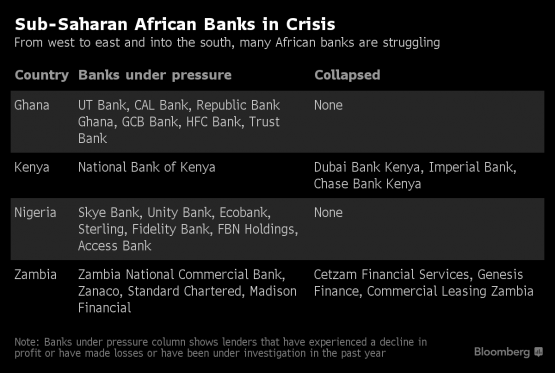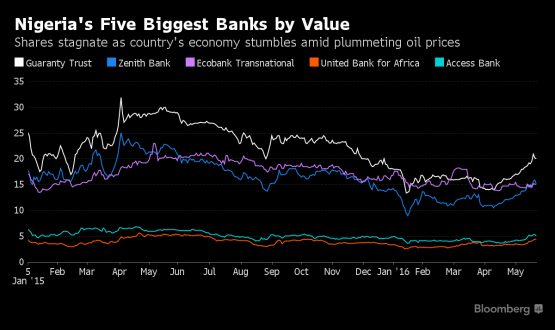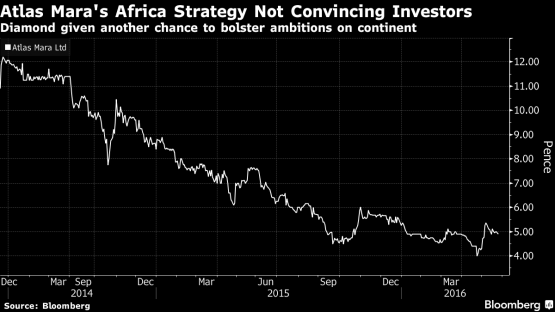Africa's fading economies risk taking down more lenders with them.
Renee Bonorchis, Bloomberg | 26 May 2016 02:05
The continent was once so lauded as the next big investment destination that it lured the likes of ex-Barclays Plc Chief Executive Officer Bob Diamond, who started a business focused on buying African financial-services companies. He was following other lenders tapping into the region's young population, rising wealth and two decades of record growth. Now, Africa's fading economies risk taking down more lenders with them.
"Two years ago the 'Africa Rising' story was probably overblown," said Ronak Gadhia, a research analyst at London-based Exotix Partners LLP. "Those investors with hot money have been disappointed and are withdrawing."
Evidence of the fallout is mounting. Kenya and Zambia are each grappling with a series of bank failures, while lenders in Nigeria and Ghana are struggling with declining profit and depleted capital levels. Deals are also drying up, with initial public offerings and debt sales plummeting, when only last year bankers from Standard Chartered and Deutsche Bank to Citigroup and JPMorgan Chase were criss-crossing the continent wrapping up mandates.
"Financial stability risks have risen across sub-Saharan Africa," Adesoji Solanke, Renaissance Capital's head of research in Nigeria, said by phone on May 20.
'Most at Risk'A slowdown in China, Africa's largest trading partner, a commodity price rout and an energy shortfall are combining to change the playing field. Add depreciating currencies and widening government budget shortfalls and the outlook dims. The International Monetary Fund cut its 2016 growth forecast for sub-Saharan Africa by 1 percentage point to 3%.
"The markets most at risk are those with highly concentrated sector loans, for example the oil and gas sector in Nigeria," said Andy Bates, head of Africa financial services for Ernst & Young in Johannesburg.
Banks exposed to the copper industry in Zambia and the Democratic Republic of the Congo are also at threat following a 25% drop in the commodity over the past year. In Ghana and Mozambique, rising government debt levels and current-account deficits will "invariably place strain on banks," he said.
Expansion OpportunitiesThree Kenyan lenders have collapsed in the past year, mainly because liquidity is dominated by big lenders, and even as the government forecast gross domestic product growth of 6.1% this year. Ghana has six banks struggling to make returns, while Zambian authorities have seized three financial services firms, with another four battling to boost income.
Four Nigerian banks have been interrogated by the country's Economic and Financial Crimes Commission as part of a probe into illegal transactions, and another four have seen profit slump as the continent's biggest economy teeters on the edge of a recession.
For those willing to navigate the risks, expansion opportunities have opened up for buyers looking beyond the current economic slump, with lower valuations for some of the continent's lenders, said Robert Besseling, a Johannesburg-based executive director at business risk consultancy Exx Africa.
"We expect to see further consolidation in the Nigerian banking sector, and a much needed consolidation effort in countries like Kenya, Tanzania, and Ivory Coast," he said.
The exit of Barclays Plc from the continent, mainly to conserve cash by reducing its controlling stake in Johannesburg-based Barclays Africa, is also giving Diamond, 64, the chance to bolster his ambitions of building a pan-African banking group since leaving the London-based lender four years ago.
Diamond's BidDiamond has partnered US private-equity giant Carlyle Group to work on a potential bid for Barclays Africa and combine the lender's operations in 12 countries on the continent with Atlas Mara, a venture he started in 2013 and which has since made purchases to gain access to seven markets in the region.
He has yet to convince investors of the strategy and analysts have criticised Atlas Mara for overpaying for deals, with the stock halving in the two years after its initial public offering. A spokesman for London-based Atlas Mara declined to comment to e-mailed questions before the release of first-quarter earnings scheduled for release on Thursday.
Stronger Balance Sheets"Initially, African banks with stronger balance sheets will be able to benefit, however investors from China, the Gulf, and other Asian countries such as India and Japan will certainly seek to enter new markets too," Besseling said.
The continent's larger banks aren't standing still. Morocco's Attijariwafa Bank is eyeing Kenya, Ethiopia and Nigeria. Banks from South Africa, which hold more capital than regulators require, are also looking for potential targets, with FirstRand, the continent's largest bank by market value, and Old Mutual Plc's Nedbank, both expressing interest in Kenya.
The continent's growth story isn't over, according to Exotix's Gadhia. It has a young and growing population of 1.1 billion and commodity cycles turn. The price of oil has jumped 85% from a 12-year low earlier this year.
"The dedicated money is still in Africa," Gadhia said. "The opportunity remains. It's still under-penetrated with fairly fast-growing economies. People forget what a frontier market really is. You've got to realize there are risks and structural challenges and cycles."
© 2016 Bloomberg
Source: Trouble is brewing in banks across sub-Saharan Africa



No comments:
Post a Comment